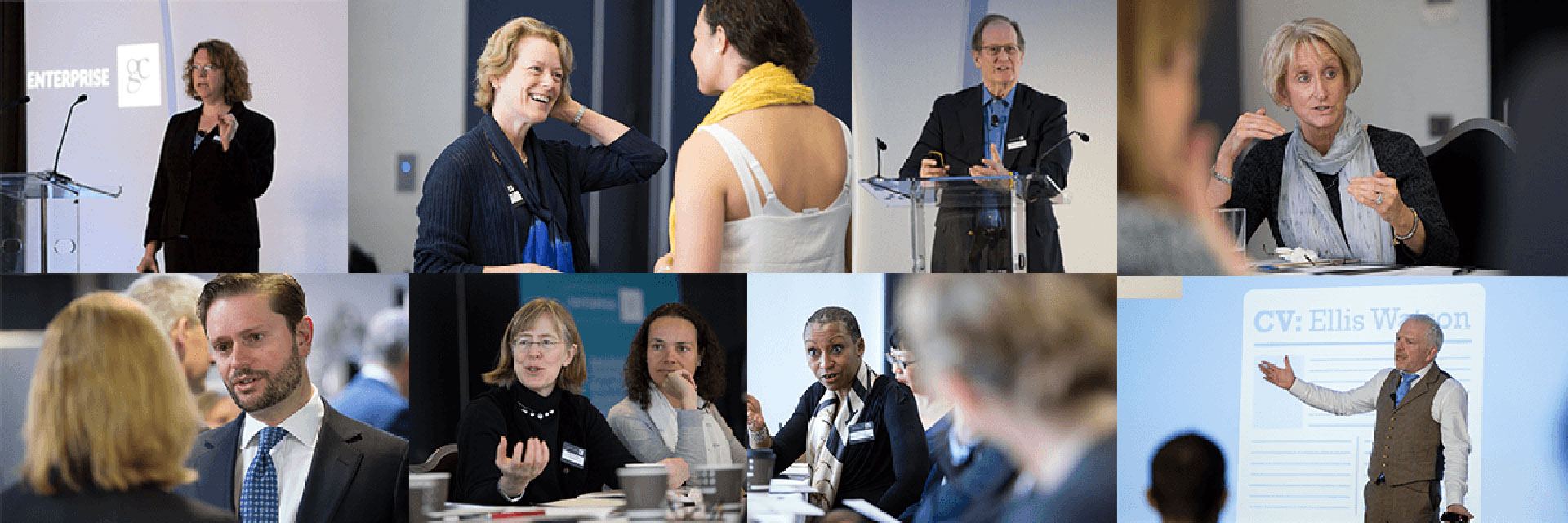Tom Sager, former general counsel for DuPont, addressed attendees on day one about the evolution of the GC role from the perspective of someone who drove significant change within his own legal function at DuPont.
‘I think that the role of the GC is becoming increasingly a member of the executive leadership team, and with that comes an obligation to speak their language,’ said Sager.
He challenged those in attendance to consider the role of legal within their respective businesses, but also beyond the traditional in-house directive – which stimulated discussion about the role GCs can play in the context of the wider business.
In challenging economic times for a number of businesses, the importance of financial nous for understanding the wider context of how their company operated was seen as imperative.
Richard Taylor, general counsel at EU Networks, was looking to a tough economic landscape to provide speed bumps for in-house legal departments to contend with over the coming years.
‘The biggest challenge that I see coming is the macroeconomic environment and how that’s leading to a bit more uncertainty at the moment,’ Taylor told GC.
‘That always flows through to the legal functions, whether it’s harder to do business, or businesses who you are working with are having difficulty or regulatory issues of their own.’
Similarly, Kirsty Cooper group general counsel and company secretary for Aviva, had the big picture at the fore – citing the possibility of the UK exiting the European Union (Brexit) as the most concerning potential issue on the horizon for her to deal with.
‘I think if [Brexit] happens, it will have ramifications for all companies – not just insurance companies. We’re trying to scenario plan as best as we can,’ explained Cooper.
‘We’re looking at both staying in, which would mean that hopefully things will just be business as usual. But with leaving, there’s a lot of known unknowns, we won’t actually know how that could play out.’
Driving an uncertain macroeconomic and geo-political environment has been low global commodity prices – with the bottoming out of the price of oil the most prevalent. That’s a factor that a number of attendees at Enterprise GC cited as concerning them – but perhaps no more so than Tom Melbye Eide, general counsel upstream for Shell.
‘As we operate in the oil and gas industry, the biggest challenge at present is the oil price. We are in the low turn; a reduction of income means that there are risks which we need to face which are different during an oil boom. In particular, those are factors such as credit risk and discussions with host countries about government take,’ said Eide.
‘It’s a lower overall cost scenario so we need to be more effective with utilising our resources.’
While doing more with less has been predicated on a lower oil price for Eide, deployment and utilisation of increasingly finite resources was a challenge that nearly all GCs were grappling with.
For Sandie Okoro, general counsel of HSBC Global Asset Management, it was new demands from inside the business and an evolving internal mandate which was driving change.
‘The role of the general counsel is really changing. In addition to our day jobs as legal advisers, we’re also risk stewards and tasked with being there to identify other risks within the business that might not have been otherwise identified,’ explained Okoro.
‘We have to be quite creative as well in the way that we express what it is we’re here to do for the business, because they want us to get involved with more stuff with fewer resources. It is generally an overall challenge, but I think if we work smartly with law firms and smartly with internal resources, we can certainly achieve that.’
Just how GCs approach that changing paradigm varied, but one of the more interesting tactics came from Dan Webster, general counsel at Harrods.
‘We have to find a way to entrepreneurially manage our teams, so that they’re able to do more work for themselves,’ explained Webster.
‘The upshot has been that we don’t need to outsource as more, but when we do, we have the budget and the time to do that. We know what we don’t know.’
‘One of the attractions of an in-house position is that we’re a team of people who are required to have adaptable skills, learn different skillsets and work within a smaller legal department.’
Webster told GC he planned to take his entrepreneurial approach to managing his team and see how it compared with other in-house department management strategies while at the Enterprise GC conference.
‘As a general counsel, you’re peerless within an organisation. Having the opportunity to brush shoulders with my peers and to hear epitaphs from experts in other fields who are lecturing and giving us new ideas on how to operate our teams and as a GC,’ said Webster, explaining the value proposition of the event.
In fact, many of the GCs we spoke to explained that the opportunity to hear from their contemporaries and learn strategies for dealing with a challenging external environment and a growing internal mandate was extremely valuable.
‘What I’ve really enjoyed about this conference is how open people have been and willing to share,’ said Sarah Davis, group commercial legal director for The Guardian.
‘People are chipping in with real, practical advice that I’m going to shamelessly steal when I get back to the office! Every session there’s something I’ve come away with thinking ‘I can do that’, ‘I can use that’, or ‘I’m watching out for that pitfall.’’
‘As an in-house senior lawyer, you’re quite lonely. It’s rare to be in a room with your cohorts, your peers, just sharing your problems and sharing best practice.’
To find out more about Enterprise GC 2016, click here



